Born Again as a Girl Treated Like a Dirty Rag
What is menstruation? What is the menstrual bicycle?
How is menses related to human rights?
What do people need to manage their flow?
What happens when menstruation cannot be managed properly?
What are symptoms or disorders related to period?
What is PMS and when does it occur?
When does menstruation start? Is the onset of period earlier today than it used to be?
What are mutual myths and taboos about menses? How do they affect the condition of women?
What is period poverty?
What are positive aspects of menstruum?
Does flow limit what people tin practice?
What is UNFPA doing on the issue of menstrual health?
Can a person go significant during menstruum?
Is menstruum bad for the environment?
Are menstrual products bad for your wellness?
How will the COVID-xix pandemic affect people'due south ability to manage their menstruum?
What is menstruation? What is the menstrual cycle?
Menstruation is the process in which the uterus sheds blood and tissue through the vagina. This is a natural and healthy process for girls and women of reproductive historic period. In Western communities, this is ofttimes chosen "the period." It typically lasts 2 to five days, but this varies by individual.
When a person begins to menstruate, this is called menarche. The age of menarche varies by individual.
Flow is part of the menstrual bike – a bicycle of biological changes that take place in a adult female or girl's reproductive system to set up her body for a potential pregnancy. The changes are triggered by hormones, which are natural chemicals in the body. This cycle begins when a girl reaches puberty and continues until she reaches the stop of her fertility (also known every bit menopause, at which time menstrual cycles stop).
The menstrual cycle is roughly 28 days long, simply it can be shorter or longer. Information technology begins with catamenia (considered day 1 of the cycle). Menstruation is the shedding of the lining of the uterus and the remnants of the unfertilized egg. It continues with an increase in the hormone estrogen, and the lining of the uterus becomes thick and spongy again (typically days half dozen-8). An egg is released from one of the ovaries, chosen "ovulation" (around day 14, simply this tin vary), then the egg moves through the fallopian tube towards the uterus (typically day fifteen-24). If the egg is not fertilized, information technology will not exist implanted in the uterine wall simply instead fall apart, and hormone levels such as estrogen and progesterone, will drop. This process is followed by the outset of a new cycle.
While a person'due south menstrual cycles may be consequent – even predictable – they can also change or vary, particularly in the starting time few years later menarche. Some changes, such as absence of bleeding, signal a pregnancy. Other changes can be related to contraceptive apply, stress, diet, concrete activity or health concerns. Some bicycle changes are simply a natural part of ageing.
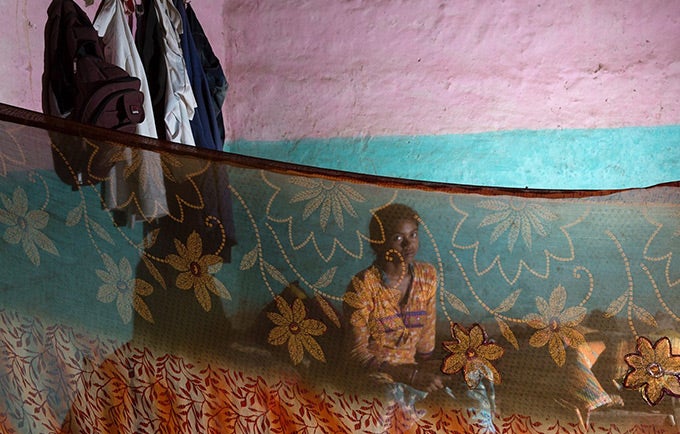
a sari, when she has her periods. She wears the same apparel and uses the same utensils when she
menstruates; these are believed to be unclean and cannot exist taken into the domicile, even after her period
is over. © UNFPA Bharat
How is flow related to human rights?
Human rights are rights that every human beingness has by virtue of his or her human nobility. Menstruation is intrinsically related to human dignity – when people cannot access safe bathing facilities and safe and effective means of managing their menstrual hygiene, they are non able to manage their menstruation with dignity. Menstruation-related teasing, exclusion and shame also undermine the principle of human nobility.
Gender inequality, farthermost poverty, humanitarian crises and harmful traditions can all turn menstruation into a time of deprivation and stigma, which can undermine their enjoyment of fundamental human rights. This is true for women and girls, likewise as for transgender men and nonbinary persons who menstruate.
Over the lifetime of a person who menstruates, they could easily spend three to eight years menstruating, during which they might face period-related exclusion, neglect or bigotry.
A variety of factors affect how people are treated during menses (and other times when they experience vaginal haemorrhage, such as during post-partum recovery).
Exclusion from public life
One of these factors is the perception that period is dirty or shameful. This view contributes to restrictions women and girls face during vaginal bleeding, which exist in many, if not most, countries. Some restrictions are cultural, such equally prohibitions on treatment food or entering religious spaces, or the requirement that women and girls isolate themselves. (See examples of flow taboos and bigotry here.) Some restrictions are cocky-imposed; women or girls may fear participating in activities like school, athletics or social gatherings. Together, these practices tin can reinforce the idea that women and girls take less claim to public spaces, and that they are less able to participate in public life.
Barriers to opportunities
Another common misconception is that women and girls have diminished capacities, whether physical or emotional, due to their menstrual cycles. These ideas can create barriers to opportunities, reinforcing gender inequality. In truth, most women and girls do not take their abilities hindered in any way by menstruation.
Barriers to sanitation and health
Poverty and humanitarian crises can limit women'south and girls' access to culturally appropriate, high quality menstrual supplies and safe, private washing facilities.
Vulnerable women and girls in middle- and high-income countries tin can likewise face poor access to safe bathing facilities and menstrual supplies – including those in impoverished school systems, prisons and homeless shelters.
Heightened vulnerability
The onset of menstruation, called menarche, can undermine girls' human rights. In many places around the world, menarche is believed to exist an indication that girls are ready for marriage or sexual activity. This leaves girls vulnerable to a host of abuses, including kid wedlock and sexual violence.
Deeply impoverished girls have been known to engage in transactional sexual practice to afford menstrual products.
Below is a listing of universally agreed human rights that can be undermined by women'south and girls' treatment during menstruation:
- The right to health - Women and girls may feel negative wellness consequences when they lack the supplies and facilities to manage their menstrual health. Menstruation stigma tin can also prevent women and girls from seeking treatment for menstruum-related disorders or pain, adversely affecting their enjoyment of the highest attainable standard of health and well-beingness.
- The right to education- Lack of a safe place or ability to manage menstrual hygiene also every bit lack of medication to treat menstruation-related pain tin all contribute to higher rates of school absenteeism and poor educational outcomes. Some studies take confirmed that when girls are unable to adequately manage menstruation in school, their school attendance and performance suffer.
- The correct to work - Poor admission to safe means of managing menstrual hygiene and lack of medication to treat menstruation-related disorders or pain also limit chore opportunities for women and girls. They may refrain from taking sure jobs, or they may be forced to forgo working hours and wages. Flow-related needs, such equally bathroom breaks, may be penalized, leading to unequal working conditions. And women and girls may face up workplace discrimination related to menstruation taboos.
- The right to non-discrimination and gender equality - Stigmas and norms related to menstruation can reinforce discriminatory practices. Catamenia-related barriers to school, work, health services and public activities also perpetuate gender inequalities.
- The correct to h2o and sanitation - Water and sanitation facilities, such as bathing facilities, that are private, prophylactic and culturally adequate, along with a sufficient, prophylactic and affordable h2o supply are basic prerequisites for managing menstrual health management.
What practice people need to manage their menstruation?
Health issues detail to women's and girls' bodies – including not but menstruation but too pregnancy, childbirth, post-partum changes and menopause – have often been disregarded by conclusion-makers, policymakers, educators and even medical establishment. Equally a result, women and girls frequently know little about the changes they will experience every bit they advance through life. Many girls learn about menstruation only when they achieve puberty, which can be a frightening and confusing experience.
People of different gender diversities, as well, such every bit transgender men and nonbinary people, often face additional barriers to information and supplies to safely manage menstruation, including possible threats to their rubber and well-existence.
In the last few years, however, menstrual health and hygiene direction take get topics of conversation among girls' advocates, education experts, humanitarian professionals, human rights and global development specialists.
There is now wide agreement about what is required during menses:
- They must have safe access to clean fabric to blot or collect menstrual blood, and these items must be acceptable to the individuals who need them.
- They must exist able to modify these materials in rubber and privacy, and have a place to dispose of used menstrual supplies or to wash reusable supplies.
- Menstruating people must besides be able to safely and privately launder with soap and water.
- They should have basic didactics almost the menstrual bike and how to manage menstruation without discomfort or fright.
- People who menstruate should as well have access to wellness data and care, ensuring they are able to brand informed choices about how to manage their catamenia, and enabling them to seek care if they feel menstruation-related disorders.
Menstrual products must also be safety, effective and acceptable to the people who use them. These products may include: Dispensable menstrual napkins (likewise commonly called sanitary napkins, sanitary towels or menstrual pads), reusable menstrual napkins, disposable tampons, menstrual cups, and clean, absorbent fabrics such as cloths or flow underwear.
UNFPA distributes menstrual products to women and girls in humanitarian crises. The pick of production is often adamant by cultural and logistical needs. For example, in some communities, women are non comfortable with insertable supplies such as tampons or menstrual cups. In humid or rainy conditions, reusable menstrual pads may be difficult to thoroughly dry, peradventure contributing to infection risks. In other weather condition, lack of waste matter management systems might make reusable products more than desirable than disposable ones.
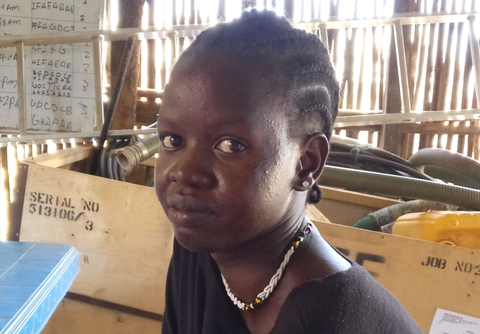
Nyanjuma Galoth, was living in a noncombatant protection camp in Juba,
South Sudan. © UNFPA South Sudan/Juma Delu
What happens when menstruation cannot exist managed properly?
Lack of access to the right menstrual products may lead to greater run a risk of infection. For case, some studies show that, in locations with high humidity, reusable pads may not dry thoroughly, possibly contributing to infection risks.
In some cases, women and girls do non have access to menstrual products at all. They may resort to rags, leaves, paper or other makeshift items to blot or collect menstrual blood. They may also exist prone to leaks, contributing to shame or embarrassment.
1 report has suggested that there may be an increased gamble of urogenital infections, such equally yeast infection, vaginosis or urinary tract infections, when women and girls are not able to bathe and/or change or make clean their menstrual supplies regularly. However, there is no clear causal relationship, and urogenital infections are more often caused past internal, than external bacteria.
Women and girls living in extreme poverty and in humanitarian crises may be more likely to confront these challenges. In one Syrian refugee community, for example, health workers reported seeing loftier levels of such vaginal infections, perhaps a result of poor menstrual hygiene management. However, at that place is no strong evidence nearly the risks and prevalence of such infections.
Cultural expectations and beliefs can besides play a function. Some traditions discourage menstruating people from touching or washing their genitals during menses, which might increase their vulnerability to infection and discomfort, and could affect their sense of dignity.
What are symptoms or disorders related to menstruation?
Menstruation is often different from person to person, and even one person can experience very different periods over their lifetime. This is oft salubrious and normal. But when menstruation prevents people from engaging in regular activities, medical attending is required. Unfortunately, lack of attending to, and education almost, menses means that many women and girls endure for years without receiving care. Below are some of the weather condition and disorders related to menstruation.
One common menstruation-related complaint is dysmenorrhea, also known as menstrual cramps or painful periods. It often presents equally pelvic, abdominal or dorsum hurting. In some cases, this hurting can be debilitating. Studies show that dysmenorrhea is a major gynaecological upshot amidst people around the world, contributing to absence from school and work, as well every bit diminished quality of life.
Sometimes, menstrual irregularities can indicate serious disorders. For instance, some women and girls may experience abnormally heavy or prolonged bleeding, chosen menorrhagia, which could signal a hormonal imbalance or other concerns.
Excruciating pain or excessive bleeding during catamenia tin can also indicate reproductive problems such as endometriosis (when the uterine lining grows outside of the uterus) or fibroids (lumpy growths in the uterus).
Irregular, exceptional or prolonged periods tin point disorders such as polycystic ovary syndrome.
Extremely heavy periods tin can as well increment the risk of iron-deficiency anaemia, which can cause extreme fatigue, weakness, dizziness and other symptoms. Severe or chronic atomic number 26-deficiency anaemia can cause dangerous complications during pregnancy as well as physiological problems.
The hormonal changes associated with the menstrual cycle can as well cause physical and emotional symptoms, ranging from soreness, headaches and muscle pain to anxiety and depression. These symptoms are sometimes considered premenstrual syndrome (PMS), but when severe or disabling they are sometimes considered premenstrual dysphoric disorder.
There are likewise weather condition that can exacerbate menstruation-related complaints. For instance, studies bear witness that female person genital mutilation tin crusade longer and more painful periods.
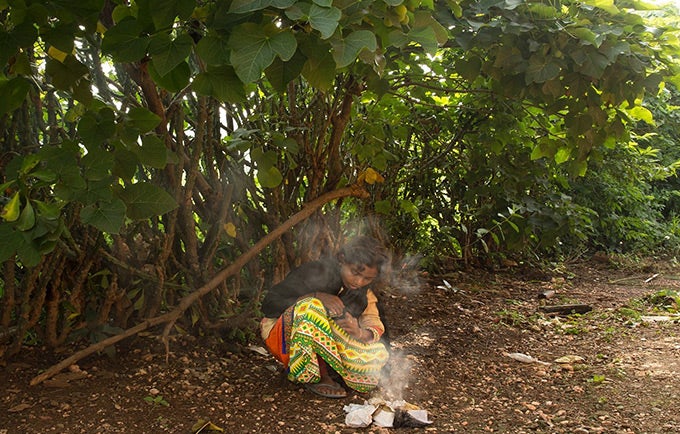
on them, which is considered inauspicious. © UNFPA India
What is PMS and when does it occur?
Most people who menstruate feel some physical or emotional discomfort known as premenstrual syndrome (PMS) about a week before or during the first few days of their menstrual periods.
PMS manifests differently in different people and may vary between menstruation cycles. The near common symptoms during PMS include changes in ambition, backaches, acne, bloating, headaches, depression, feelings of sadness, tension or anxiety, irritability, sweating, tender breasts, water retention, constipation or diarrhea, trouble concentrating, insomnia and tiredness. For some, these symptoms can be so severe that they miss work or school, while others are non bothered.
On average, women in their 30s are nearly likely to have PMS. PMS may also increase as a person approaches menopause because of the fluctuations in hormone levels.
It is not really known why people feel PMS. Researchers believe it is because of the dramatic drop in estrogen and progesterone that takes place subsequently ovulation when a woman is not pregnant. PMS symptoms ofttimes disappear when the hormone levels begin to rising once more.
About half of women who need relief from PMS also have another health problem, such every bit depression or feet disorders, myalgic encephalomyelitis/chronic fatigue syndrome, irritable bowel syndrome, and float pain syndrome.
Stereotypes and stigma surrounding PMS can contribute to discrimination. For case, people may assume that PMS affects all women, or that it undermines women'due south competence in the schoolhouse or workplace.
When does menstruation starting time? Is the onset of period earlier today than information technology used to be?
The onset of menstruation, chosen menarche, varies from person to person. Information technology commonly starts between the ages of ten and 16.
In rare cases, menarche can accept place earlier a girl reaches age seven or viii. Menarche tin can besides be delayed or prevented due to malnutrition, excessive exercise or medical bug.
It is hard to know the global average age of menarche, because recent and comparable data are difficult to find. One study from 1998 found that 14 is a typical age of menarche.
Some studies have found that menarche is occurring earlier amid girls in sure places, often in high-income countries and communities. Research from countries such as South Africa suggest these changes are related to diet and socio-economic status, pregnant that as nutrition and health improve, girls' bodies may mature slightly earlier. Even so, lack of systematically nerveless data from low-income countries means that broader or global conclusions cannot exist made.
Similarly, it is difficult to determine the average age at which menstruation ends, known as menopause. Data from 1999 propose an boilerplate historic period of around 50.
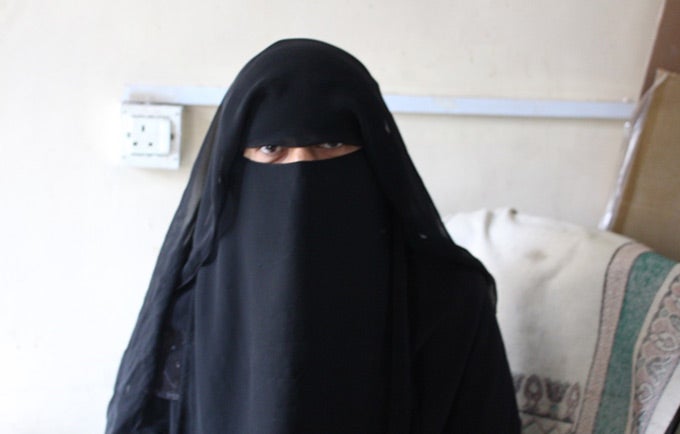
underwear. I came from an uneducated family so I did not know that there were menstrual pads used
for this purpose."
What are common myths and taboos about flow? How do they affect the status of women?
Menstrual taboos take existed, and still be, in many or most cultures. Around the world and throughout history, misconceptions about menstruation have led to women'due south and girls' exclusion from all kinds of roles and settings – everything from leadership positions to space travel. Beneath is a non-exhaustive list of menstruation myths and taboos, as well as their impact on women and girls.
Myth: Catamenia is muddy or dangerous
Menstrual blood is composed of regular claret and tissue, with no special or unsafe properties. All the same throughout history, many communities take thought the mere presence of menstruating women could crusade harm to plants, food and livestock. In the 1930s, Western scientists hypothesized that menstruating women'due south bodies produced "menotoxins," a kind of poison.
People proceed to hold like behavior today. Some communities believe women and girls can spread misfortune or impurity during menstruation (or other vaginal bleeding). Every bit a result, they may face restrictions on their 24-hour interval-to-twenty-four hour period behavior, including prohibitions on attending religious ceremonies, visiting religious spaces, treatment food or sleeping in the home.
In western Nepal, the tradition of chhaupadi prohibits women and girls from cooking food and compels them to spend the night outside the dwelling, often in a hut or livestock shed. Similar rules apply to women and girls in parts of Bharat and other countries. (In one rural community in Ethiopia, the taboos nearly vaginal haemorrhage led not only to women and girls being exiled from the home during menstruation, but also during childbirth and postpartum bleeding.) Isolation and expulsion from the home are oft dangerous for women and girls – and can even be fatal. For example, women and girls in Nepal accept been exposed to extreme cold, animate being attacks or even sexual violence.
(It is important to note that not all aspects of these traditions are negative. In some places, limitations on women's and girls' activities requite them an opportunity to return their maternal dwelling house to relax. Encounter more than hither.)
Menstrual stigmas also touch how women and girls are able to manage their health and hygiene. Some cultures prohibit women and girls from touching or washing their genitals during menstruation, maybe contributing to infections. In some parts of Afghanistan, information technology is fifty-fifty believed that washing the torso during menses tin can lead to infertility. In other places, women and girls are fearful that their bodies could pollute h2o sources or toilets.
These beliefs also touch on how women and girls dispose of menstrual products. In some places, women burn menstrual pads to avert cursing animals or nature. In other places, burning menstrual products is believed to cause infertility. Some communities believe menstrual products should exist cached to avert attracting evil spirits. Others believe improper disposal of these products tin cause a girl to menstruate continuously for life.
Myth: Certain foods are off-limits to menstruating women and girls
Many communities believe menstruating women and girls cannot eat certain foods, such as sour or common cold foods, or those decumbent to spoilage. In fact, there are no medically recommended restrictions on the kinds of food menstruating people can or should eat, and dietary restrictions can actually put them at adventure by limiting their nutrient intake.
Myth: Catamenia indicates readiness for marriage and sex
In many places around the earth, a girl's offset period, called menarche, is believed to be a sign that she is ready for spousal relationship, sex activity and childbirth. This leaves girls vulnerable to a host of abuses, including child marriage, sexual violence or coercion, and early pregnancy. While catamenia is one indication of biological fertility, information technology does non mean girls have reached mental, emotional, psychological or concrete maturity. In rare cases, menarche can take identify before a daughter reaches age 7 or eight, for case. And even older teens may not be mature enough to make informed choices about spousal relationship, sexual activity or motherhood.
Myth: Period limits women'south abilities
Catamenia is also usually believed to limit women'due south physical or mental abilities. Nineteenth century physicians, for example, believed that periods "return it extremely hundred-to-one how far they can be considered responsible beings." Similar ideas persist today. Women may face degrading comments almost menstruum affecting their physical or emotional states. They may exist excluded from certain roles or positions of leadership.
Myth: Existent women menstruate
Women can also face stigma and mistreatment for non having periods. Those who do non menstruate may be disparaged equally "not real women." Such perceptions contribute to some women's reluctance to employ contraceptive methods that affect their menstrual cycles.
These behavior can adversely affect women who do non experience regular monthly period, such as women who have irregular cycles and transgender women.
These ideas are also harmful to transgender men who menstruate. These men can face up discrimination, express admission to catamenia products and poor access to safe, private washing facilities.
Taboo: Menstruation should not be discussed publicly
Silence most menstruation tin lead to ignorance and neglect, including at the policy level. This leaves women and girls vulnerable to things similar period poverty and bigotry. It also adversely affects women and girls with heightened vulnerabilities. Those living with HIV tin can face stigma when seeking sanitation facilities, menses supplies and wellness care, for instance. Those in prisons or other forms of detention may exist deprived of period supplies.
Myth: All women are moody when they menstruate
The menstrual cycle is driven by hormonal changes. These have different effects on unlike people. In some women, moodiness is a side-issue of these hormonal changes. Other women do not experience mood changes.
Myth: Menstruation is a women's issue but
While information technology is true that menses is experienced in the bodies of women and girls – every bit well as other individuals such as non-binary and trans persons– menstrual health issues are human rights issues, and therefore of importance to society as a whole. This means that men and boys must be involved in conversations nigh gender equality and promoting positive masculinities aiming to eliminate menstruation-associated stigma and bigotry.
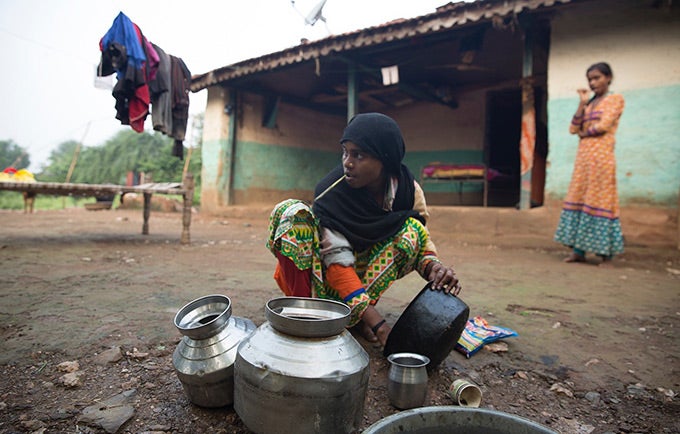
sari, when she has her periods. She wears the same clothes and uses the same utensils when she
menstruates; these are believed to be unclean and cannot be taken into the home, even after her period
is over. © UNFPA India
What is period poverty?
Catamenia poverty describes the struggle many low-income women and girls confront while trying to beget menstrual products. The term also refers to the increased economic vulnerability women and girls face due the financial burden posed by menstrual supplies. These include not just menstrual pads and tampons, but also related costs such every bit pain medication and underwear.
Period poverty does non only affect women and girls in developing countries; it too affects women in wealthy, industrialized countries.
Difficulty affording menstrual products can cause girls to stay home from school and work, with lasting consequences on their educations and economical opportunities. It can also exacerbate existing vulnerabilities, pushing women and girls closer toward dangerous coping mechanisms. Studies in Kenya, for example, accept shown that some schoolgirls have engaged in transactional sexual practice to pay for menstrual products.
Catamenia poverty is not but an economical issue, but a social and political 1 as well. For instance, some advocates accept chosen for menstruation products to be revenue enhancement exempt. Such efforts in India have resulted in the elimination of tax on menstrual pads and tampons.
What are positive aspects of menses?
Regular menstruation can be an indication that a adult female'due south reproductive health is on runway.
It can assistance women empathise and, in a general style, monitor their fertility. For instance, many women regard their monthly period as an indication that they are non pregnant. (This method is not foolproof, however, since fifty-fifty significant women can feel haemorrhage, such as implantation bleeding).
Some traditions offering menstruating women and girls a chance to bond with one some other. In Rajasthan, Bharat, where menstruum can restrict women's and girls' activities, recently married women may apply it equally an opportunity to visit their maternal families. Catamenia can also be an opportunity to take a break from regular responsibilities. 1 girl in Rajasthan, Poonam, told UNFPA that she is happy that she is non expected to help out with household chores when she is menstruating.
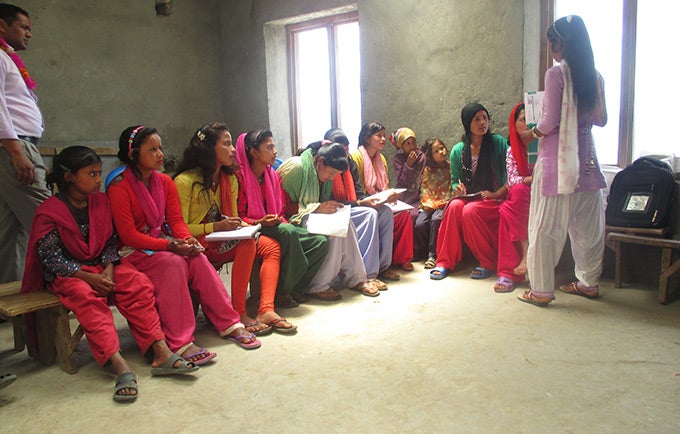
catamenia. These sessions are part of the UNFPA-UNICEF Global Programme to Accelerate
Action to End Child Marriage. © UNFPA Nepal/Dhana Bahadur Lamsal
Does menstruation limit what people can do?
No. While menstruation has been used throughout history to exclude women and girls from all kinds of roles and settings, in that location is really nothing that menstruating people cannot do. Exercise, swimming, bathing, work and sex are all possible during menstruation.
In some cultures, in that location are restrictions on what people can practise during menstruation, merely these are customs, beliefs and traditions and accept zero to practice with people's bodily abilities. Menstruating women can – and have – competed in the Olympics, run marathons, traveled to space, held leadership roles, served as judges and held religious offices.
All the same, the management of menses does influence what people can exercise; women and girls may prefer to get swimming when they have access to menstrual cups or tampons, for instance. Menstrual symptoms can also affect what people feel similar doing.
What is UNFPA doing on the issue of menstrual health?
UNFPA has four broad approaches to promoting and improving menstrual health around the world.
Start, UNFPA reaches women and girls directly with menstrual supplies and rubber sanitation facilities. In humanitarian emergencies, for example, UNFPA distributes dignity kits, which contain dispensable and reusable menstrual pads, underwear, lather and related items. (In 2017, 484,000 nobility kits were distributed in 18 countries.) UNFPA also helps to ameliorate the safe of toilets and bathing facilities in deportation camps by working with camp officials, distributing flashlights and installing solar lights.
UNFPA likewise promotes menstrual wellness data and skills-edifice. For example, some UNFPA programmes teach girls to make reusable menstrual pads. Others enhance awareness about menstrual cups.
Second, UNFPA works to better education and information near period and related homo rights concerns. Through its youth programmes and comprehensive sexuality education efforts, such as the Y-Peer programme, UNFPA helps both boys and girls understand that menstruation is good for you and normal. UNFPA too assistance raise awareness that the onset of menstruation (menarche) does not signify a physical or psychological readiness to be married or bear children. The UNFPA-UNICEF Global Programme to Accelerate Action to End Kid Marriage, for instance, teaches girls and communities about reproductive health and the harms caused by child marriage. Programmes to end female genital mutilation, including the UNFPA-UNICEF Articulation Program to Eliminate FGM, raise awareness of the negative consequences the practice can have on menstrual wellness.
Third, UNFPA supports national health systems, which can promote menstrual health and provide handling to girls and women suffering from menstrual disorders. This includes promoting boyish- and youth-friendly wellness services, which can help girls and young women better understand and care for their bodies. UNFPA also supports the hiring and training of wellness workers, particularly midwives, who tin can provide care for, and data about, menstrual health complaints. UNFPA also procures reproductive health commodities that tin can be useful for treating menstruation-related disorders. For instance, hormonal contraceptive methods tin be used to treat symptoms of endometriosis and reduce excess menstrual haemorrhage.
Last, UNFPA is helping to gather data and evidence about menstrual health and its connexion to global development – a long overlooked topic of inquiry. For instance, UNFPA-supported surveys provide critical insight into girls' and women'due south knowledge about their menstrual cycles, health and admission to sanitation facilities. And a recent UNFPA publication provides a critical overview of the menstrual health needs of women and girls in the Eastern and Southern Africa region.
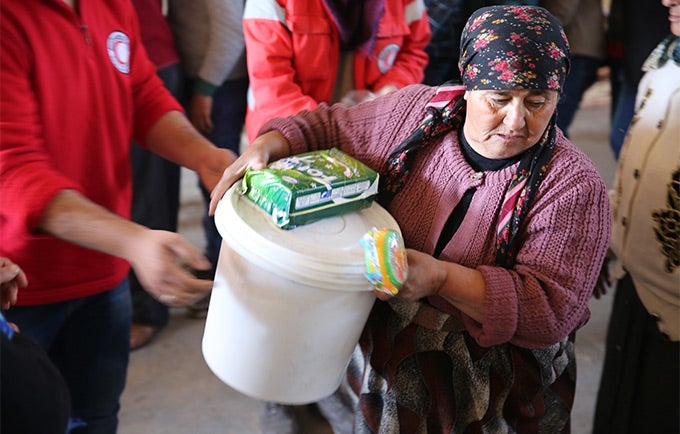
packages of supplies called dignity kits. © UNFPA Syria/Sufian Abdulmouty
Tin can a person become pregnant during menstruation?
Yes. Information technology is widely believed that intercourse during menstruation cannot outcome in pregnancy. However, this is not truthful for women and girls with shorter or irregular menstrual cycles. Not-menstrual vaginal bleeding may also be mistaken for period, which tin can convey a faux sense of security against pregnancy. The only reliable way to prevent pregnancy is to utilise a mod form of contraception.
Is flow bad for the environment?
No, catamenia in itself is slap-up for the environment. Even so, products used to manage menstruation can accept a negative affect on the surround, depending on the product and the manner it is disposed.
Menstrual products such every bit tampons and pads often contain plastics and chemicals that are bad for the environment. The time it takes for them to dethrone in a landfill is centuries longer than the lifespan of a woman. Menstrual products can too exist found in bodies of h2o and along shorelines. The manufacturing process to produce menstrual products as well has ecology consequences.
More environmentally friendly options include reusable menstrual cups as well as reusable and/or biodegradable pads.
But in many places, alternative methods are not bachelor or culturally adequate. In all circumstances, the choice of menstrual product must be acceptable to the people using them. For instance, some women are not comfortable with insertable products like menstrual cups. In humid environments, reusable menstrual pads may exist difficult to thoroughly dry.
Given the potential ecology consequences of disposable menstrual products, it is important to expand the range of methods available to women, allowing them to make informed choices that fit their needs.
Are menstrual products bad for your health?
In general, no. However, there are possible health impacts to consider.
Utilise of highly absorbent tampons has been associated with toxic stupor syndrome (TSS), a life-threatening status, just these cases are rare. Oft changing tampons greatly lowers the gamble of TSS.
People with sensitive skin may have reactions to the materials used in menstrual products, such as the fragrances used in some pads.
In addition, many countries practise not obligate manufacturers to disclose the ingredients or components of menstrual products, which could atomic number 82 to women existence exposed to unwanted materials. Some tampon brands, for example, contain chemicals similar dioxins. At that place has been little enquiry to determine the health consequences, if any, acquired by exposure to these chemicals.
How will the COVID-19 pandemic affect people'southward ability to manage their menstruation?
Communities around the world are feeling the numerous and overlapping effects of the COVID-19 pandemic. These may accept significant impacts on some people'southward power to manage their menses safely and with nobility:
- Gaps in provision of water and sanitation services, such as lack of sewage maintenance or disruption of water supply, will accept a straight impact on people's ability to manage their menstruum.
- Stock-outs and supply chain disruptions hateful that communities could lose admission to menstrual pads, tampons and other menstrual materials.
- People who may exist quarantined because they accept either contracted or come into contact with someone who has contracted COVID-19 may have express access to menstrual products or running water.
- Financial stress on families who may be underemployed due to the pandemic may lead to households prioritising other basic needs like food or household bills over menstruation supplies.
- Increased prices of menstrual wellness supplies due to increased demand, panic-buying or disrupted supply chains may get out some without supplies, or without the supplies of their choice.
- Lack of noesis of one's own menstruation and menarche may contribute to stress and anxiety. The pandemic may limit access to critical information related to menstrual health due to disruption of regular health services, school closures, limited access to technology and intermission of community-based programming.
In times of global crises, such as this pandemic, information technology is critical to ensure that menstruating people keep to have admission to the facilities, products and information they need to protect their dignity, wellness and well-beingness. Decision-makers must assure these essential menstrual health items remain available.
summershicientich.blogspot.com
Source: https://www.unfpa.org/menstruationfaq
Post a Comment for "Born Again as a Girl Treated Like a Dirty Rag"